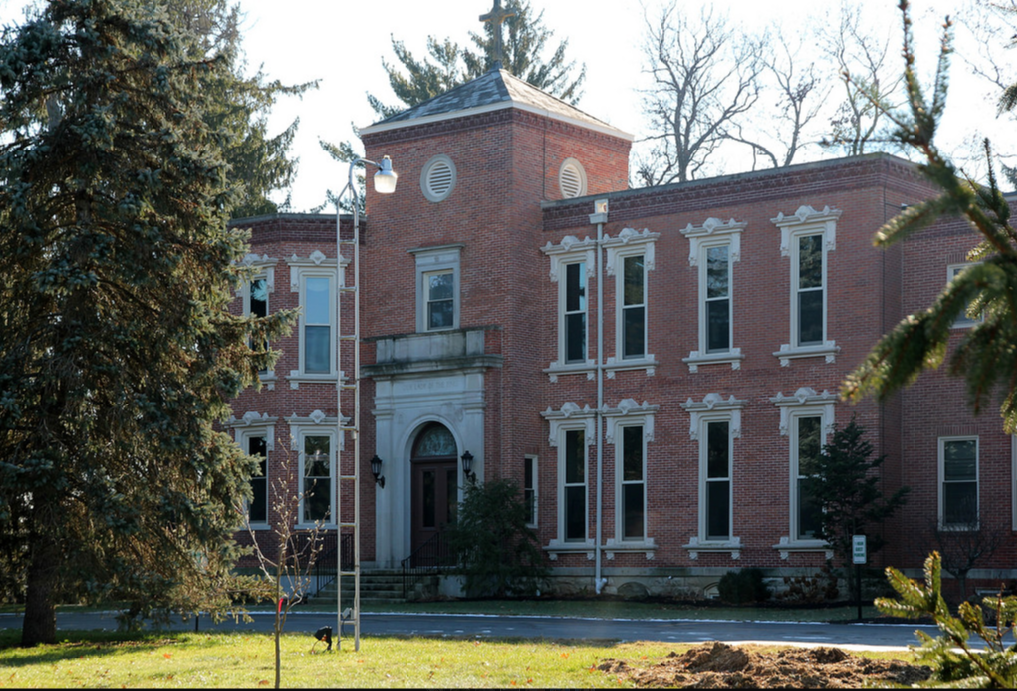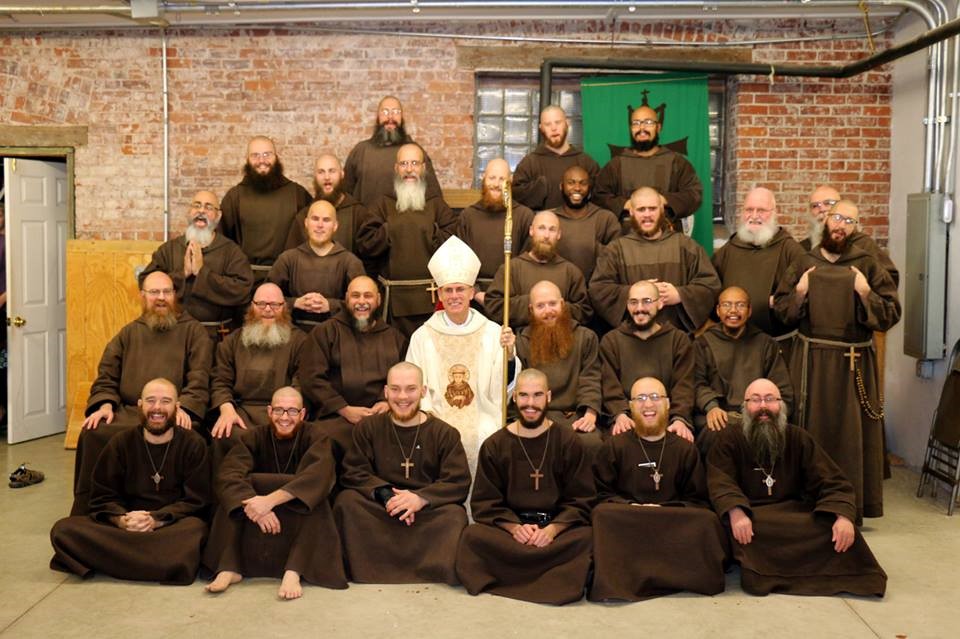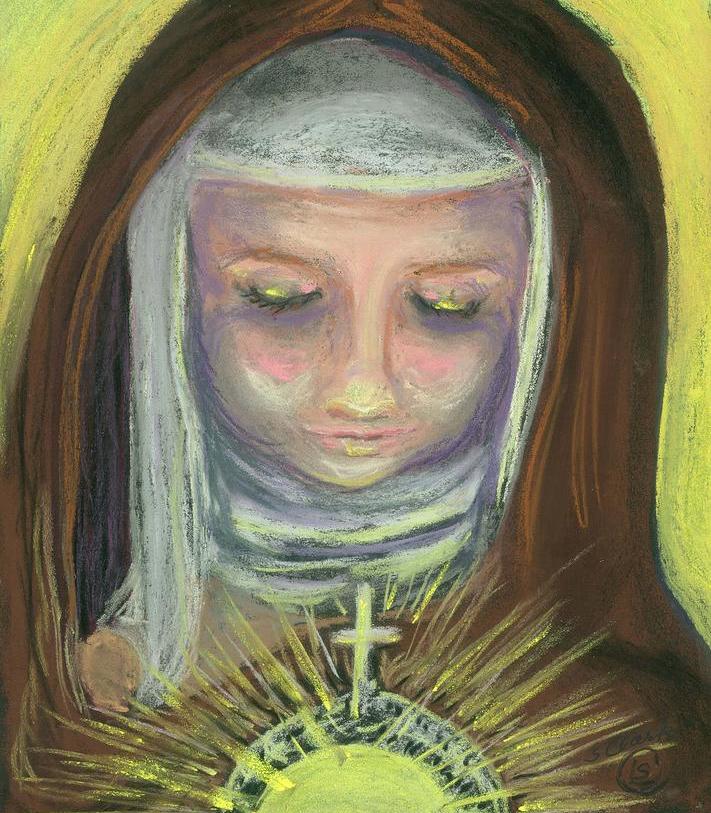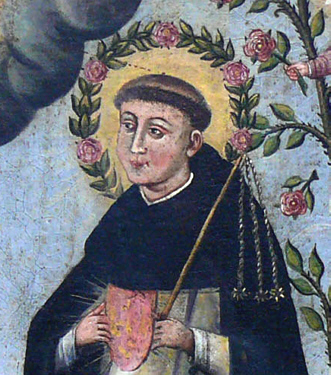
Retreat center, my room far left, second floor bay windows.
Thursday morning, looks like another rainy day, loving everything. Splendor in ambiance, this room supplies space to contemplate and adore. The Our Lady of the Pines website identifies my room as the McAuley Room. No wonder I’m developing such an affection for the saint. There is a stairwell next to my room, mid-travel she waits, posed in a painting (same image posted). At the bottom of the stairs stands a superb St Joseph statue. I start my day with prayers to St Joseph, seeking guidance for manliness; the embodying of strength within wisdom, gentleness, and kindness. Ascending and descending to my room: Holy Water, sign of the cross, the chapel: kneeling in prayer and a greeting to the Eucharist reposed in the Tabernacle a part. The retreat center, a mansion, was constructed in 1874 by a wealthy local jeweler Lewis Leppleman as a single family dwelling.
Last night a unique communal prayer session occurred. I saw a posting, yet when I walked by I felt hesitant, abstaining. The chapel was filled with thirty sisters, no men. I walked away content not to take part. I spoke with the night front desk clerk, attaining a multi electrical outlet strip. Walking past one of the sisters smiled in a welcoming greeting. In my room, a sense I should go to the prayer group settled in. I responded, forcing myself to go. I am a coward in presenting myself. Down the steps, I suddenly decided to act like I had no intention of going into the chapel, walking to the front lobby. Once in the lobby, registering my cowardly behavior, I consoled myself with the thought that they could not have me arrested. Once at the chapel, I held my breath, spotting an open seat by the front door. I crossed myself with Holy Water, genuflected and sat myself as inconspicuously as one can be when one is blatantly conspicuous. I blocked everything out, going into meditation, prepared for one of the sisters to tell me it was for religious sisters only. None did. I opened my eyes, feeling really awkward being the only male, plus nonreligious. I noticed several chuckling, finding amusement in my distress. One warm smile forthrightly announced welcome before standing and leading the prayer session. It was interesting, a meditation upon our hands. The thought of my hands. Where my hands have been. What they have touched. What they have created. What they have destroyed. What they have loved. Through my hands many things have been done. My hands as a baby, soft and supple. The thought of the hands of my friend Janet, now ninety-six preparing for an end. The thought of the healing hands of Christ. ‘The Kingdom of God is at hand’.
There are intentional thoughts, arguments, I dismiss, refuse to address. The sisters are taking me in, having welcomed me spiritually. Deeply within their silence, I find peace. I am grateful and pleased. God is showing me something. I needed their maturity. Their refined formation. Their years of service. Their silence. See how nature–trees, flowers, grass–grows in silence; see the stars, the moon and the sun, how they move in silence…We need silence to be able to touch souls (Blessed Mother Teresa). It is not a concept, something to tell others. It is reality.
I thought of Father David Mary, my time with him in the friary, almost two years of acquaintance. Those who know me know I have whined about Father David Mary. Let’s be clear his community is authentic, mature formation. He is a priest of power and might, wielding an effective animated message, invigorating especially for young people. Young people adore him and his friars. Softball games breakout, heated dodgeball games are waged, and a Saturday evening Sunday vigil youth mass always resounds with praise–youthful hearts raised in beating. The friar’s daily experience possesses a level of religious devotion and daily living steadfast within the Holy Spirit. They are being formed through a devout pious superior process. Few will encounter such a life. Father David Mary, his friars, and sister community of Poor Clares are heavy hitters within the Catholic Church, functioning at a spiritual level few can comprehend. It is not superior skills or intellect that elevates their daily lives. It is community service, humble devotion, continual prayer-including two daily Holy Hours, transforming fun-loving camaraderie, living detached from worldly matters, an absolute dedication to the spiritual life consecrated to the Church, an unconditional obedience to Catholicism, a striving to grow in faith, hope, and charity. Apropos words from St John of the Cross: Charity, too, causes a void in the will regarding all things, since it obliges us to love God above everything. A man has to withdraw his affection from all in order to center it wholly upon God. Christ says through St Luke: “He who does not renounce all that he possesses with his will cannot be my disciple”. (Luke 14:33) Upon this retreat, watching rain once again pelt my tremendous bay window, I realize God has blessed me once again with people functioning on a high spiritual level.

I determined this post would be short, trying to hold to my conviction. Other writing calls. My spiritual director and I are bonding. Daily, I meet with her for an hour. She is affirming so much, providing inspiration and guiding, challenging yet broadening, assisting in disarming. Who am I? I am Catholic to become holy. I am not Catholic to determine and enforce dogma, to impose duelistic self-will. I am not Catholic through self-love, the need to be recognized as an authority or intellectual, a searcher of social worlds to dally within; sweet consolations, reputation, and the pursuit of accolades are rejected. Something deeper draws me inward. As Father Roger declares, ‘Are you truly being transformed through your faith?’ Does my conduct draw me closer to Christ? Defining the question by what it is not. It does not ask: Do you know more? Do you write poems? Do you have the right opinions? Do you go on retreats? Do you do more? Do you go to mass more? Father Roger simply asks: Am I being transformed? My spiritual director understands my concerns; my strengths and weaknesses. My interest in poetry, prompted the suggestion I employ myself in the effort of writing Haiku poetry. Simple three line poems: first line five syllables, second line seven, and third line five. Tears come to my eyes, I worked for hours producing fifty. She touched something dear and close to my inner most being. She opened me. Strangely a quote from Crane Hart, of all places, comes to my mind: ‘One must be drenched in words, literally soaked in them, to have the right ones form themselves into the proper pattern at the right moment’.
Faith in things unseen
Beyond intellect achieve
Within God center
Hope blank memory
Unpossessed beautiful things
Await gratefully
Love avert free will
Embrace brothers and sisters
God royally reigns
Wisdom clarity
Eternal uncreated
In love resound truth
Gentleness true strength
Reign in sensitivity
Jesus’ soft touch
Chastity Christ like.
Mother Mary obedient
Joseph most chaste spouse
Balanced vigilance
Eyes present gazing intent
A white owl aware
Unknown unnamed God.
Beware man wanders hunting
Empty the ocean
Prayerful tendering
Hollow gentle persuasion
Care full infusion
Grateful spacious room
Our Lady of the Pines shines
Loving light reveal
Understanding see
Revealed, discursive thinking
Biblical teaching
Self-control discipline
Charioteer cracks the whip
Appease strong horses
A vow, a life lived
A sister’s silent intent
Christ’s majestic hand
Scripture, Mercy Seat
Old and new softly alight
Cherubim, wings touch
Francis dreamed knightly
A poor lady came weeping
A leper kissing
NOTE: For the sake of phone app viewing I was forced to format as I did. My website building skills are limited. I find little pleasure in researching or expanding my skills. I stated last week I was going to organize and expand this website, however I feel God is taking me in another direction. I am trying to spend only relevant time upon the blog.






Recent Comments